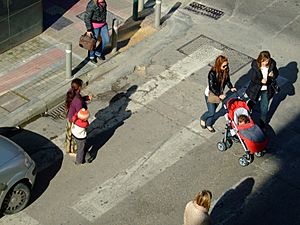Social environment facts for kids
The social environment is everything around you that affects your life. This includes the people you meet, the places you live and learn, and the culture you are part of. It's like the world you grow up in and interact with every day.
Your social environment includes your family, friends, school, and community. It also covers the institutions you deal with, like shops or libraries. These interactions can be face-to-face or through things like social media. Your social environment is a bigger idea than just your social class or friend group.
This environment is very important for how people age. A good physical and social environment helps people stay active and healthy as they get older.
Connecting with Others: Social Solidarity
When people share a similar social environment, they often feel a sense of connection. This is called social solidarity. They tend to trust and help each other. They might even think in similar ways, even if they don't always agree on everything. This often leads them to form social groups.
For example, students in the same school might feel a bond. They share experiences and understand each other's challenges. This feeling of solidarity helps communities work together.
Our Changing Environment: Natural and Human-Made
People use natural resources to make their lives better. In doing so, they change the natural environment. Think about how we build houses, roads, and farms. We also create dams and other structures. All these things are part of our human-made, or cultural, environment.
Many people still live in villages. A village is a community with places for work, living, and cultural activities. Governments often work to improve rural areas. This includes building new homes, expanding towns, and creating better roads. These changes help shape the social environment for everyone living there.
See also
 In Spanish: Entorno social para niños
In Spanish: Entorno social para niños
- Alfred Schütz – The four divisions of the lifeworld
- Communitarianism
- Community of practice
- Family nexus
- Framing (social sciences)
- Generalized other
- Microculture
- Milieu control
- Milieu therapy
- Pillarisation
 | Janet Taylor Pickett |
 | Synthia Saint James |
 | Howardena Pindell |
 | Faith Ringgold |


